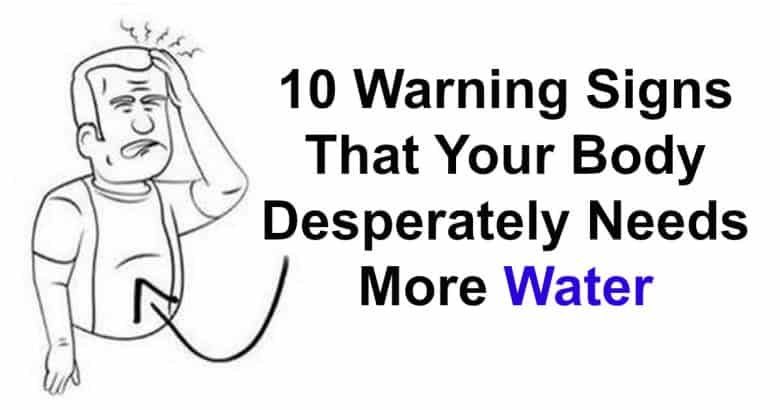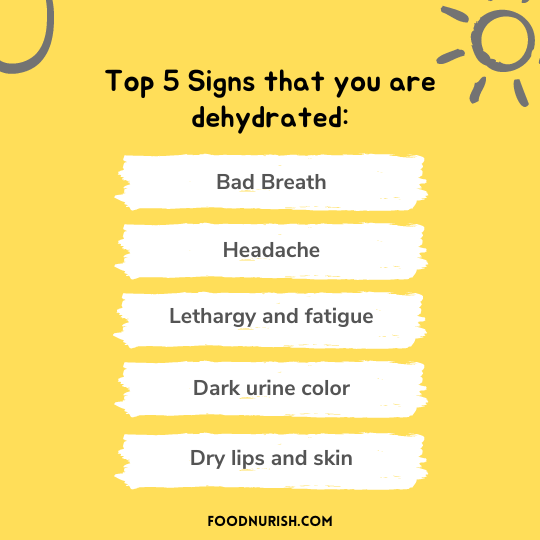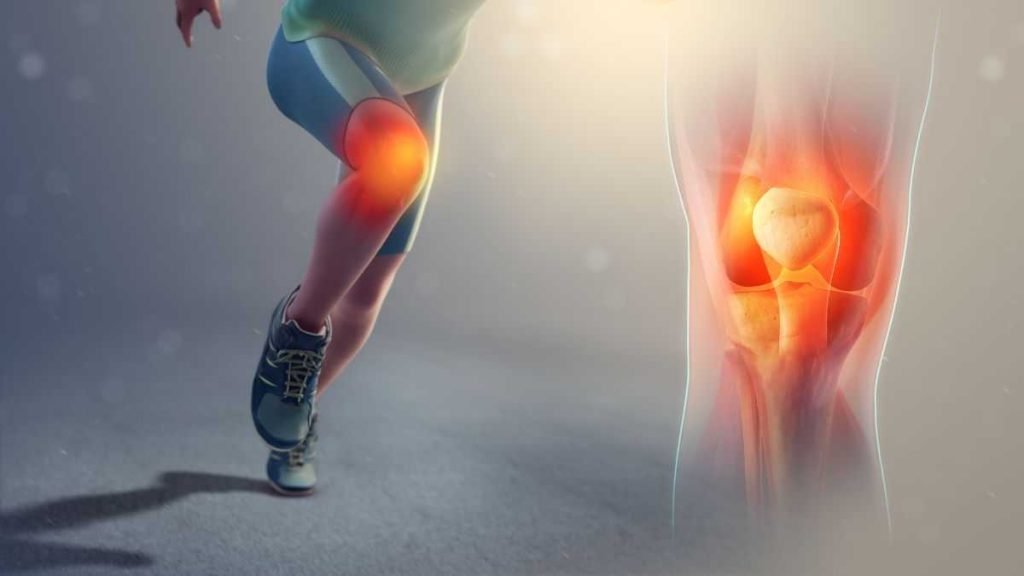10 Warning Signs And Symptoms of Dehydration You Should Know About

Water is essential for life and makes up about two-thirds of our body weight. It is crucial for various bodily functions, such as digestion, joint lubrication, toxin removal, and maintaining healthy skin. However, dehydration is a common yet often overlooked condition that can have serious consequences if not addressed.
In our fast-paced lives, it’s easy to neglect the importance of staying hydrated. We lose water through everyday activities like breathing, sweating, and waste elimination. Failure to replenish these losses can lead to dehydration. Recognizing the early signs of dehydration is crucial for maintaining good health and well-being.
This article explores the top 10 signs and symptoms that indicate your body urgently needs hydration. These symptoms range from mild indicators like dry mouth and fatigue to more severe ones like dizziness and rapid heart rate.
The key signs and symptoms of dehydration include:
- Bad breath – Dehydration reduces saliva production, allowing bacteria to spread and cause bad breath.
- Headaches – Dehydration can reduce fluid around the brain, causing it to bump against the skull and leading to headaches. It also reduces glucose, oxygen, and blood supply to the brain.
- Lethargy and fatigue – Fluid loss decreases blood volume and increases blood pressure, forcing the heart to work harder and causing tiredness.
- Dark urine – Dehydration prevents the kidneys from properly flushing out toxins, leading to dark-colored urine.
- Dry lips and skin – Dehydration reduces fluid content in skin cells, causing dryness, itchiness, and loss of skin elasticity.
- Heart palpitations – Dehydration can upset the balance of sugar, salts, and minerals in the body, affecting the heart and causing abnormal heart rhythms.
- Food cravings – People may crave sweet or salty foods when dehydrated, and should instead consume water-rich fruits and vegetables.
- Painful muscles and joints – Dehydration can decrease magnesium levels, leading to muscle pain and cramps. It also reduces water content in cartilage, causing joint pain.
- Poor digestion and constipation – Dehydration reduces water for breaking down food and can lead to hard, difficult-to-pass stools.
- Brain fog – Lack of water can impair cognitive functions like memory, concentration, and mood.
Signs And Symptoms Of Dehydration

1. Bad Breath
Dehydration can cause bad breath because it reduces the amount of saliva in your mouth. Saliva helps wash away food particles and bacteria, keeping your mouth clean and fresh.
When you’re dehydrated, your mouth becomes dry, allowing bacteria to grow more easily. These bacteria break down food leftovers and release stinky compounds that cause bad breath.
Dehydration also makes it harder to keep your mouth healthy, increasing your risk of gum disease and tooth decay, which can further contribute to bad breath.
To prevent this, it’s important to drink enough water every day and practice good oral hygiene like brushing and flossing regularly.
2. Headaches
Dehydration can cause headaches because it affects the normal functions of your brain and body.
When you don’t have enough water, your brain can actually shrink a little bit and pull away from your skull, causing pain. Dehydration also reduces the amount of blood and oxygen that gets to your brain, which can make blood vessels in your brain expand and lead to headaches.
Additionally, dehydration can cause an imbalance of important minerals called electrolytes, like sodium and potassium, which help your nerves and muscles work properly.
When these electrolytes are out of balance, it can disrupt the normal signaling in your brain and potentially trigger headaches.
Dehydration can even make your brain more sensitive to pain, making headaches feel worse.
To prevent dehydration headaches, it’s important to drink plenty of water throughout the day, especially when it’s hot or after physical activity. Consuming drinks or foods with electrolytes can also help restore proper balances in your body.
3. Lethargy And Fatigue
Dehydration can make you feel tired and sluggish because it affects how your body produces energy. Water is involved in many of the processes that create energy for your cells.
When you’re dehydrated, these processes don’t work as well, leading to less energy being produced. Dehydration also reduces blood flow, which means your muscles and brain don’t get enough oxygen and nutrients they need to make energy efficiently.
This lack of oxygen and nutrients contributes to feelings of fatigue. Additionally, dehydration causes an imbalance of electrolytes which are necessary for cells to function properly and produce energy.
Dehydration can also impair brain function, making it harder to concentrate and stay alert, leading to mental fatigue.
4. Dark Urine
Dark urine is a sign that you’re dehydrated and need to drink more fluids.
When you’re dehydrated, your urine becomes darker in color. This is because there’s less water in your body, so the waste products and toxins that get removed through your urine become more concentrated.
Your kidneys try to conserve water by making less urine, which makes the urine even more concentrated and darker.
Dehydration also causes your urine to have a higher specific gravity, meaning there are more dissolved substances in it.
Drinking water and liquids with electrolytes can help dilute your urine, making it lighter in color and indicating that you’re rehydrated.
Here’s an urine color chart that shows approximately the color of urine when you are dehydrated..

5. Dry Lips and Skin
We have about 30% of water in our skin. It is resilient, elastic and plump.
Dehydration can make your skin and lips dry. When you don’t drink enough water, your skin’s protective barrier gets weaker, which lets moisture escape and makes your skin flaky.
Also, without enough water, your skin becomes less stretchy and feels tight. This is because the cells in your skin need water to stay plump and healthy.
Dehydration also affects the oils in our skin that keep it moist; when these oils are reduced, our lips and skin can become very dry.
To prevent this, drink plenty of water every day, use moisturizers and lip balms to help keep moisture in, and eat lots of fruits and vegetables to help hydrate your body from inside out.
6. Heart Palpitations
Dehydration can also cause heart palpitations, which means your heart might beat irregularly or too fast.
When you don’t drink enough water, your body’s electrolytes like potassium and sodium get out of balance. These minerals help your heart work properly, and if they’re not balanced, it can affect how your heart beats.
Also, dehydration reduces the amount of blood in your body, making less oxygen available to your tissues. To keep up with the need for oxygen, your heart starts beating faster.
This extra effort puts stress on the heart and can make you feel like it’s fluttering or skipping beats.
7. Food Cravings
Yes, you’ve heard that right..
Dehydration can make you feel hungry even when your body really needs water. This happens because the part of your brain that controls hunger and thirst, called the hypothalamus, gets mixed up and thinks you need food instead of water.
When you’re dehydrated, your body might also crave quick energy from high-calorie foods to help boost your low energy levels.
Plus, an imbalance in minerals like sodium and potassium due to dehydration can make you want certain foods more than usual.
Even your mood can play a role; feeling off because you’re dehydrated might lead you to reach for comfort foods as a pick-me-up.
8. Painful Muscles and Joints

There are among 65 and 80% of water in our cartilage. [1]
When you don’t drink enough water, your body lacks important minerals like potassium and sodium, which help muscles work properly. This can lead to muscle cramps and joint stiffness.
Also, without enough water, your joints don’t get enough lubrication, making them stiff and painful. Your bones may start grinding which will inflame them and we’ll feel great pain.
Dehydration also means less blood flow to muscles and joints, so they don’t get the nutrients they need, leading to more pain from inflammation.
Plus, when you’re dehydrated during activities like sports, you’re more likely to get injuries like sprains because your muscles and joints aren’t as flexible as when hydrated.
9. Poor Digestions and Constipation
Dehydration can also cause problems with your digestion and lead to constipation. When you don’t drink enough water, your body doesn’t produce enough digestive enzymes, which are needed to break down food properly.
This can make it hard for your body to absorb important nutrients and might leave you feeling uncomfortable after eating.
Also, without enough water, your stool becomes hard and difficult to pass, leading to constipation. This can cause stomach pain and bloating.
Dehydration also messes up the balance of minerals like potassium and sodium in your body that help move food through your intestines smoothly.
Additionally, not having enough water reduces the mucous in your gut; this mucous helps protect the lining of your stomach and makes it easier for food to pass through.
10. Brain Fog
Unfortunately, lack of water or dehydration also causes cognitive functioning problems and mood swings.
Some of the problems which might appear are: decreased psychomotor skills, arithmetic ability, short-term memory, visuomotor tracking, perceptual discrimination etc.
We might also feel high or low energy, exhaustion, anger or confusion.
Daily Hacks To Stay Hydrated
Here are some tips to help you drink more water and stay hydrated:
- Keep water bottles or cups near you, like at your desk, in your car, or next to your bed, so you can easily sip water throughout the day.
- Drink water before going to work or school, before bedtime, and when you wake up in the morning. This helps ensure you’re hydrated all day long.
- Try to stay cool and avoid getting overheated, as this can make you lose more water from sweating.
- Eat foods with high water content, like watermelon, pineapple, and cucumbers, to help you get more water from your diet.
- Avoid sugary drinks like soda and energy drinks, as they can actually dehydrate you and cause an imbalance of important minerals in your body.
- If you sweat a lot from exercise or physical activities, consider drinking sports drinks like Gatorade or Pedialyte to replace the fluids and minerals you’ve lost.
- Add slices of fruit, mint, or cucumber to your water to give it a refreshing flavor, making it more enjoyable to drink.
- Make it a habit to drink water at specific times, like when you wake up or before meals, to help you remember to stay hydrated.
- If you’ll be active for a long time, like hiking or playing sports, you might want to use a hydration backpack or vest to carry water with you and sip it regularly.
The key is to make drinking water a regular part of your daily routine and find ways to make it more convenient and enjoyable for you.
Bottom Line
Dehydration is a serious issue that can cause big problems if not taken care of. It’s important to know the early signs, like bad breath, headaches, feeling very tired, and dark-colored urine.
To avoid getting worse symptoms such as heart fluttering, muscle cramps, and confusion, you should drink lots of water and fluids that have electrolytes.
You can keep yourself hydrated by always having water nearby, eating fruits and vegetables that contain a lot of water, and making drinking water a regular habit. Paying attention to how much water your body needs every day is key to staying healthy.
